|
|
|
Sort Order |
|
|
|
Items / Page
|
|
|
|
|
|
|
| Srl | Item |
| 1 |
ID:
106607
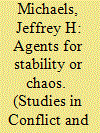

|
|
|
|
|
| Publication |
2011.
|
| Summary/Abstract |
Recent discussions among U.S. officials about how the intelligence community can demonstrate its "relevance" to counterinsurgency have been dominated by an ideology that presupposes large-scale military intervention, and in which the role of intelligence is limited to improving analysis in support of current military activities, with little debate of future requirements. This article will highlight a number of alternative conceptions of intelligence "relevance" to counterinsurgency, based on a study of several historical and contemporary U.S. and non-U.S. cases, and by applying a wider definition of counterinsurgency that includes cases where the military plays a subordinate role relative to the intelligence services.
|
|
|
|
|
|
|
|
|
|
|
|
|
|
|
|
| 2 |
ID:
106000
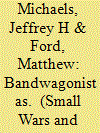

|
|
|
|
|
| Publication |
2011.
|
| Summary/Abstract |
This paper seeks to explore how a particular narrative focused on population-centric counterinsurgency shaped American strategy during the Autumn 2009 Presidential review on Afghanistan, examine the narrative's genealogy and suggest weaknesses and inconsistencies that exist within it. More precisely our ambition is to show how through a process of 'rhetorical re-description' this narrative has come to dominate contemporary American strategic discourse. We argue that in order to promote and legitimate their case, a contemporary 'COIN Lobby' of influential warrior scholars, academics and commentators utilizes select historical interpretations of counterinsurgency and limits discussion of COIN to what they consider to be failures in implementation. As a result, it has become very difficult for other ways of conceptualizing the counterinsurgency problem to emerge into the policy debate.
|
|
|
|
|
|
|
|
|
|
|
|
|
|
|
|
| 3 |
ID:
179762
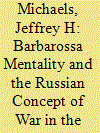

|
|
|
|
|
| Summary/Abstract |
The legacy of the Great Patriotic War, particularly the June 1941 ‘surprise’ attack, remains alive and well in contemporary Russia’s foreign and defense policies. Most notably, it serves as the basis for contemporary Russian ideas about ‘strategic deterrence’ and features as an underlying motive of Russia’s relationship with NATO. Even if the idea of a US/NATO initiation of war on the Russian Federation seems absurd, the fact this idea has remained alive and well for more than seven decades would seem to indicate that efforts to change this mindset, perhaps by revisiting the German invasion and demonstrating why a ‘21st century Barbarossa’ is indeed absurd, should be prioritized as part of any effort to improve NATO-Russia relations.
|
|
|
|
|
|
|
|
|
|
|
|
|
|
|
|
| 4 |
ID:
111616
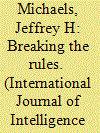

|
|
|
| 5 |
ID:
146212
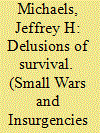

|
|
|
|
|
| Summary/Abstract |
When North Vietnam launched a military offensive in March 1975, there was little expectation that South Vietnam would collapse 55 days later. As the South’s forces quickly crumbled and the scale of the military disaster became increasingly apparent, the United States considered a number of options to provide emergency assistance to its ally. This article will examine the evolution of the diplomatic, economic, military, and covert options US policymakers developed to support the South during the Final Offensive. These policy options will be set against the backdrop of the ‘scripts’ US officials devised to justify emergency assistance, as well as their delusions about the South’s prospects for survival.
|
|
|
|
|
|
|
|
|
|
|
|
|
|
|
|
| 6 |
ID:
108303


|
|
|
|
|
| Publication |
2011.
|
| Summary/Abstract |
Jeffrey H. Michaels examines several of the analytical and practical problems of U.S. presidential foreign policy doctrines by looking specifically at the Eisenhower and Carter doctrines. He concludes that presidential doctrines are usually overrated as new statements of principle, and that the elevation of a presidential statement into doctrine can have unintended consequences.
|
|
|
|
|
|
|
|
|
|
|
|
|
|
|
|
| 7 |
ID:
193166
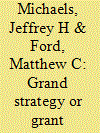

|
|
|
|
|
| Summary/Abstract |
The relationship between Strategic Studies and the American academy has always been a tenuous one. Tolerated when fully funded, the field quickly lost its place on campus when it failed to attract grant money. Only with the support of philanthropic foundations did it manage to gain a foothold in American universities. What emerges from our investigation is how the field has feasted during times when foundation money was available and suffered periods of famine when these funds were withdrawn. In addition, we show that during and immediately after the Cold War, the political interests of philanthropic foundations were broadly balanced. By contrast, over the last two decades, the field has been increasingly linked to financial support provided by politically right-leaning foundations. This is happening while funding from more centrist and left-leaning foundations has become much less prominent. When looking ahead at the field’s future health, we cannot but help be concerned about the implications of this development.
|
|
|
|
|
|
|
|
|
|
|
|
|
|
|
|
| 8 |
ID:
132255
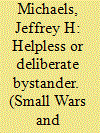

|
|
|
|
|
| Publication |
2014.
|
| Summary/Abstract |
The USA's role in fomenting and responding to military coups remains an understudied and politically contentious subject despite it being a recurring foreign policy problem exemplified most recently in both Egypt and Mali. To the extent this topic has been addressed in any depth by scholars, it is mainly limited to an examination of a small number of coups that occurred during the Cold War that the CIA was accused of sponsoring. However, this emphasis on well-known cases to the exclusion of lesser-known cases has resulted in a biased view of omnipotent US power. This limitation is reflected in the case of South Vietnam, in which the focus has been placed on the 1963 coup that overthrew President Ngo Dinh Diem, whereas the numerous other coups that occurred have received little or no attention. In this article, a more inclusive approach will be taken in which US policy will be examined with respect to all of the main coups and coup attempts that occurred during the period 1954-1975.
|
|
|
|
|
|
|
|
|
|
|
|
|
|
|
|
| 9 |
ID:
111150
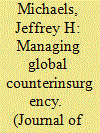

|
|
|
|
|
| Publication |
2012.
|
| Summary/Abstract |
The contemporary American counterinsurgency discourse has emphasised a particular historical narrative of Vietnam to justify large-scale military operations in Iraq and Afghanistan. Absent from this narrative is any reference to the broader Cold War context in which Vietnam existed alongside numerous other small-scale counterinsurgencies and was therefore the exception, not the rule. This article seeks to redress this shortcoming by examining the way counterinsurgency was conceived and managed at the level of 'grand strategy.' Specifically, it focuses on the Special Group (Counterinsurgency) to demonstrate that senior policymakers under Presidents Kennedy and Johnson understood 'counterinsurgency' as involving 'indirect' assistance to foreign governments, rather than taking 'direct' military action with American ground forces.
|
|
|
|
|
|
|
|
|
|
|
|
|
|
|
|
| 10 |
ID:
114380
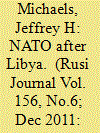

|
|
|
| 11 |
ID:
193176
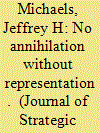

|
|
|
|
|
| Summary/Abstract |
Scholars focused on NATO nuclear strategy during the Cold War have devoted little attention to the dynamics of how the Alliance would decide to use nuclear weapons. This article aims to fill this gap by examining the internal debates about how a nuclear use decision would be taken, particularly balancing the desire to ensure adequate consultation of the non-nuclear members without undermining the credibility of NATO’s nuclear deterrent by giving them a veto. To avoid undermining Alliance cohesion, the nuclear use decision process was kept deliberately vague, despite the problems that would almost certainly have arisen in a war.
|
|
|
|
|
|
|
|
|
|
|
|
|
|
|
|
| 12 |
ID:
148072
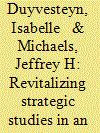

|
|
|
|
|
| Summary/Abstract |
Amidst recent Western military campaigns that have defied strategic logic and produced few, if any, tangible gains, the utility of force in contemporary conflicts is being questioned increasingly, yet very few useful answers are emerging. Unfortunately, policymakers have too limited an understanding of military affairs, and the officials and experts tasked to inform them often have vested interests or lack imagination. Whereas strategic studies scholars were once highly sought after to “think the unthinkable” and provide fresh ideas for policymakers, the field has since fallen on hard times and shows no signs of recovery. To resuscitate the field there is an urgent need for a fundamental re-evaluation of long-standing strategic concepts in light of present realities.
|
|
|
|
|
|
|
|
|
|
|
|
|
|
|
|
| 13 |
ID:
142615
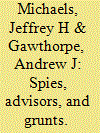

|
|
|
|
|
| Summary/Abstract |
Vietnam was a complex conflict, which historians and political scientists have struggled to understand. Some of the bitterest disputes in the historiography revolve around the US approach to counterinsurgency in Vietnam. Many different facets of the war have received the attention of filmmakers, and an examination of their work suggests new ways of thinking about the conflict. This article considers film portrayals of three phases of the Vietnam War – firstly, the early period of ‘political action’, then the advisory period, and finally the Americanization of the war after 1965. It suggests that by examining the experiences of participants in each of these phases, Vietnam War cinema helps to illustrate the problems that faced various American approaches to counterinsurgency in the conflict. Combined with the importance of films in determining popular perceptions of both historical conflicts and counterinsurgency in general, it suggests that they are worthy subjects of study and critique.
|
|
|
|
|
|
|
|
|
|
|
|
|
|
|
|
| 14 |
ID:
175631
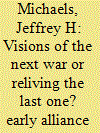

|
|
|
|
|
| Summary/Abstract |
This article examines the early NATO discourse to illuminate ideas about a future war with the Soviet Bloc. World War Two provided an important cognitive script for conceptualizing a Third World War, with the impact of the nuclear ‘revolution’ being less dominant than generally believed. I argue that officials were unable to devise a script in which the Soviet Union could conquer Western Europe and then defeat the United States. Although this inability to achieve “final victory” was believed enough to deter Moscow from aggression, the need to reassure European Allies led NATO to adopt the “forward strategy”.
|
|
|
|
|
|
|
|
|
|
|
|
|
|
|
|
|
|
|
|
|